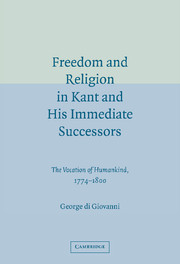Book contents
- Frontmatter
- Contents
- Preface
- Abbreviations
- 1 Introduction: The Vocation of Humankind, 1774
- 2 The Taming of Kant: Popular Philosophy
- 3 The Intractable Kant: Schultz, Jacobi, Reinhold
- 4 Of Human Freedom and Necessity
- 5 Kant's Moral System
- 6 The Difference That Fichte Made
- 7 The Parting of the Ways
- 8 The Vocation of Humankind Revisited, 1800: Conclusion
- Notes
- Bibliography
- Index
4 - Of Human Freedom and Necessity
Published online by Cambridge University Press: 24 July 2009
- Frontmatter
- Contents
- Preface
- Abbreviations
- 1 Introduction: The Vocation of Humankind, 1774
- 2 The Taming of Kant: Popular Philosophy
- 3 The Intractable Kant: Schultz, Jacobi, Reinhold
- 4 Of Human Freedom and Necessity
- 5 Kant's Moral System
- 6 The Difference That Fichte Made
- 7 The Parting of the Ways
- 8 The Vocation of Humankind Revisited, 1800: Conclusion
- Notes
- Bibliography
- Index
Summary
THE CLASSICAL HERITAGE
In 1788, Johann August Heinrich Ulrich, respected professor at Jena, published a little book entitled Eleutheriologie oder über Freiheit und Nothwendigkeit (Eleutheriology, or Of Human Freedom and Necessity) as a text for his Michaelmas lectures of that year. As we shall see, the text became normative for the debate on freedom that was soon to break out. In response, Kant wrote a small essay that was then turned by his friend Kraus into a review published in the ALZ in an April issue of 1788. One year later, in 1789, Jacobi published a second, much enlarged edition of his Spinoza book, which he prefaced with fifty-two propositions – twenty-three purporting to defend the thesis ‘Man does not have Freedom’; the remaining twenty-nine, the opposite thesis ‘Man has Freedom’. He also added to it eight lengthy supplements in which he restated his views regarding Spinoza and Leibniz, clarified his own position with respect to both, and sharply criticized Herder – in all instances with the issue of human freedom clearly in view. We shall return to this contribution of Jacobi in due time and to Ulrich's in just a moment. First, however, we should recall the origin of the terms in which the issue of ‘human freedom’, paramount to both works, was being discussed at the time. And, for this, we must again turn to Leibniz, for he had been the one responsible for setting them.
- Type
- Chapter
- Information
- Freedom and Religion in Kant and his Immediate SuccessorsThe Vocation of Humankind, 1774–1800, pp. 108 - 151Publisher: Cambridge University PressPrint publication year: 2005

